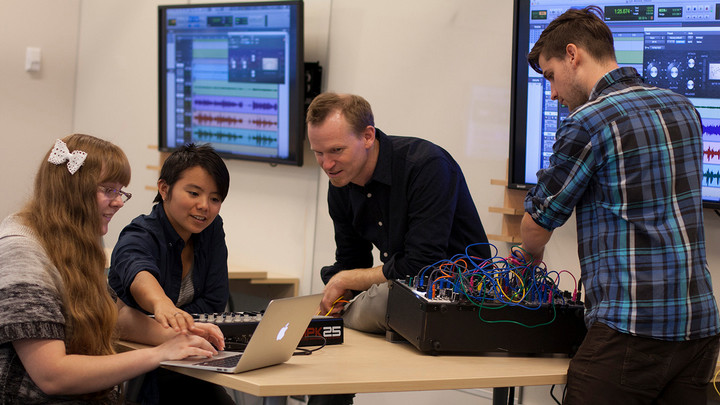Creative Research and Technology Lab: A small studio makes a big noise
June 13, 2024

Less than 10 per cent of active sound engineers and producers in Canada are women or gender diverse.
Before he joined UVic, UVic Computer Science and Music Professor Kirk McNally worked at one of the premier studios in Canada. “It upheld all of the stereotypes in every possible way,” he says. “The recording industry has historically included a very narrow section of society and excluded everyone else.” And then he saw the problem in his own class at UVic.
“A really talented student—who is both a musician and an engineer—walked into the studio with nine male students and me, and she walked out before the end of the class. It was a really significant moment for me,” he says.
Part of McNally’s strategy for the past ten years has been to expand the number of women and gender diverse students accepted into the program. He also brings Canadian and international women artists and recording engineers to campus for guest presentations and performances, people like Sarah Belle Reid, Suzanne Ciani, Amy King, Annelise Noronha and Hildegard Westerkamp. The Orion Program for Visiting Artists and Scholars in Fine Arts is making it possible for the University of York’s Jude Brereton to teach a course this autumn.
“It puts a spotlight on women, it shows a pathway,” says McNally, adding that the industry is now supporting this movement too.
Now, the ratio in the Master of Music Technology program is 42 per cent women; 26 percent of students in the undergraduate program identify as women, and four percent have not disclosed their gender identity.
McNally also founded the state-of-the-art Creative Research and Technology (CReaTe) Lab in 2020 to transform the negative aspects of audio culture, and create a positive impact on the next generation of sound engineers and producers.
Associate University Librarian—and musician—Ry Moran used the studio with eminent Indigenous musician Sebastian Gaskin. A Brazilian graduate student in the Master of Music Technology program worked on Moran’s podcast Taapwaywin, learning about sound production and, at the same time, Indigenous issues in Canada.
McNally is also collaborating with Carey Newman, recording the contributions of Indigenous community members who are contributing sounds to the Witness Blanket virtual reality project.
His Social Sciences and Humanities Partnership Development Grant with Dr. Amandine Pras of the University of York has brought scholars and producers to UVic from West Africa, where the big studios were founded by French colonial commercial interests.
Stella Drinkwater, then a first-year Valerie Kuehne Undergraduate Research Award recipient, created the soundtrack for Visual Arts professor Paul Walde’s Glacial. The five-hour ambient audio piece melds field recordings from the glacier at Mount Baker with live acoustic instruments. This has already been part of a solo exhibit at Western University in Ontario.
“The CReaTe Lab has been the draw for all those individuals,” McNally says. “Their engagement has broadened the conversation beyond the stereotypical recording studio. They, and all the students who learn and create here, are transforming the historical culture of the recording industry.”
Pictured: Kirk MacNally and students at work in the lab.
Rachel Goldsworthy
